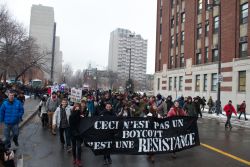Coop média de Montréal
Journalisme indépendant
Behind the numbers: six points you need to know about the PQ's "3% tuition fee indexation"
The Summit on Higher Education in Quebec--the Parti Québécois' proposed solution to last year's student strike and the social crisis that ensued--is nearly over. The big news at the end of the first day was the Quebec government's proposal of a three per cent annual increase in tuition fees, and instituting a three per cent increase cap on "ancillary fees" - the extra fees that universities charge students each year for administrative and service costs.
This proposal has been referred to variously as an "indexation," a "$70 per year increase," an increase in line with the growth of household income, and even as a kind of "freeze."
I'm not an economist, and we're still waiting for the final declarations, but already it's clear that the numbers and wording being used are misleading (even if not purposefully). So here's a bit of a break down:
1. Three per cent: This three per cent annual increase in tuition fees is the crux of the PQ's plan. But where did the three per cent figure come from? And what kind of increase does it represent?
Last week, it was revealed that the PQ was envisaging three scenarios for a tuition fee increase, based on three numbers:
- 3.5 per cent, said to be the average annual increase in operating costs for Quebec universities
- 3 per cent, said to be the annual increase in Quebec household revenue
- 2 per cent, said to be the average annual rate of inflation
Before going into where these numbers come from, a note that it does seem convenient that the Quebec government established three possibilities, and then chose the middle of the road of these three. It raises questions of what other numbers could have been considered...
The numbers themselves were proposed by the esteemed economist Pierre Fortin, and few doubt his independence, and neither do I. However, as far as I know, we haven't seen a published report on how these numbers were reached. We can, however, easily look up the annual rates of inflation in Quebec and Canada, and the average income of Quebec households over the past 14 years.
Average household incomes can be found here, thanks to Statistics Quebec. From 1996 to 2010, the average household income in Quebec has risen from $54,200 to $65,400, or by about 20 per cent. The easy way out, dividing that by 14 years, gives us an annual average of 1.47 per cent. If we add up each year's percentage change (ranging from a five per cent increase from 1997 to 1998, to a 1.9 per cent decrease from 2004 to 2005), and take the average, we get 1.36 per cent. I may be making an error or forgetting a variable, so I hope an economist sets me straight, but I have a hard time seeing where the average household income increase of three per cent comes from, based on Statistics Quebec's own numbers. (You can see my calculations, and do your own, with this spreadsheet)
Similarly, you can see the Canadian rate of inflation here, and the Quebec rate of inflation here (you'll want to zoom in to see the chart properly). It's unclear if the proposed average inflation rate of two per cent is based on Quebec, Canada, or on the monthly or yearly numbers, and over what period. But what is clear, is that inflation varies significantly over time. As does income. Which brings us to the next point...
2. "Indexation": This is not an indexation. There's little else to say here. An indexation is when you peg something to a variable rate. Calculating an average percentage and applying that does not an indexation make. There are plenty of reasons why an actual indexation may not work, or even be bad for students. Taking the average income above, tuition fee increases would vary wildly year to year, meaning households and schools could hardly plan their budgets. Discerning future students could even bet on household incomes dropping the following year (as they did between 2004 and 2005), and therefore postpone their enrollment. Unlikely and probably rare, but still possible. On the flip side, and much more probable, an unforeseen larger increase in inflation or in income (ie, the five per cent increase from 1997 to 1998) could mean more student debt.
Either way, though, this isn't an indexation - it's an increase.
3. 70$ per year: Most main media outlets are reporting that the increase is 70$ per year. Since it will be a yearly increase, the total will grow year over year. So to talk of a fixed yearly increase is disingenuous. If we take current tuition fees for full-time undergraduate students, $2167, and multiply by three per cent, we actually get an increase of $65.01 for 2013-14. I calculated the increase for the next seven years:

So you can see that $70 per year is fairly misleading, and by the time we hit the 6th year we see a $500 increase over what students were paying this year; and that by year seven, the annual increase will have reached $80 per year. It will only continue to increase from there.
This, of course, is only tuition fee increases. The government has proposed that a cap be placed on ancillary fees as well, but this is not yet final.
4. "It's another kind of freeze": According to Premier Pauline Marois, "indexing" fees means in reality maintaining a freeze, since the increase if offset by the increase in incomes. But as we've seen, this is neither a true indexation, nor does it seem likely that income will offset the continued increase in fees.
5. It's better/worse than Charest's offer: I actually haven't seen many people arguing this, but it's worth comparing. By the end of the 2012 negotiations, we were talking about an 82 per cent increase in tuition fees over a period of seven years. That would mean that by year seven (2019-2020), tuition fees would have reached $3943.94, or an increase of $1776.94. That's where the increase would have stopped (if we believe that fees would once again be frozen, which is unlikely). This is significantly higher than the PQ's proposed increase, but there's no plan for the three per cent increase to end. Both governments' proposals promised to increase student financial aid to offset the fee hike for low-income students. I won't go into the details here, but as with last year, the possibility of more loans, even with increased bursaries, doesn't offset the fact that the possibility of higher debt has been shown in studies to be a disincentive for low-income students go puruse their studies (whether there are complicated repayment plans or interest forgiveness schemes or anything else).
6. Free tuition: This proposal isn't at the table, but rather in the streets. ASSÉ has chosen to boycott the summit, since it has been clear for several weeks that the only real possibility the Quebec government was going to propose was an indexation, not even a freeze. The choice to boycott has been hotly contested. It means that the idea of free tuition wasn't debated at the summit, but that's based on the premise that the summit has been a debate at all, and not a carefully orchestrated PR maneuver by the Parti Québécois to impose a consensus it had already decided.
Others have criticized the FEUQ for staying at the table, after it became clear that even a tuition fee freeze was a long shot. By staying at the table, they had their say; if the outcome was already decided, though, would a boycott by all student groups have led to a delegitimization of the process and forced the PQ to back-off of the planned increase? It's hard to tell how it would have played out.
The FEUQ has already made it clear this morning that any increase is unacceptable, and ASSÉ has been clear on this since the start. With 40,000 students on strike today and a large demonstration planned at 2pm in Montreal, it's very possible that this three per cent increase won't be the last word on tuition fees in Quebec.
About the poster
The site for the Montreal local of The Media Co-op has been archived and will no longer be updated. Please visit the main Media Co-op website to learn more about the organization.




